The MSI Z170A Gaming M7 Review: The Step Up to Skylake
by Ian Cutress on September 21, 2015 12:30 PM EST- Posted in
- Motherboards
- Gaming
- MSI
- Skylake
- Z170
Gaming Performance 2015
Our 2015 gaming results are still relatively new, but the issue of FCLK settings might play a big role here. At launch, the default setting for the communication buffer between the CPU and PCIe stack was 800 MHz, even though Intel suggested 1000 MHz, but this was because of firmware limiations from Intel. Since then, there is firmware to enable 1000 MHz, and most motherboard manufacturers have this - but it is unclear if the motherboard will default to 1000 MHz and it might vary from BIOS version to BIOS version. As we test at default settings, our numbers are only ever snapshots in time, but it leads to some interesting differences in discrete GPU performance.
Alien: Isolation
If first person survival mixed with horror is your sort of thing, then Alien: Isolation, based off of the Alien franchise, should be an interesting title. Developed by The Creative Assembly and released in October 2014, Alien: Isolation has won numerous awards from Game Of The Year to several top 10s/25s and Best Horror titles, ratcheting up over a million sales by February 2015. Alien: Isolation uses a custom built engine which includes dynamic sound effects and should be fully multi-core enabled.
For low end graphics, we test at 720p with Ultra settings, whereas for mid and high range graphics we bump this up to 1080p, taking the average frame rate as our marker with a scripted version of the built-in benchmark.
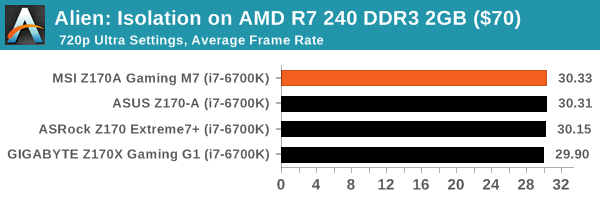
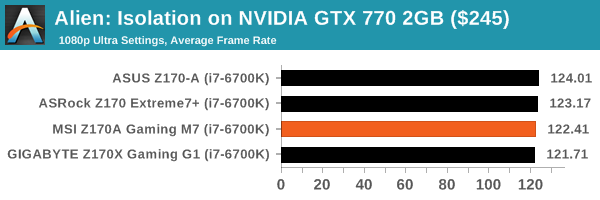
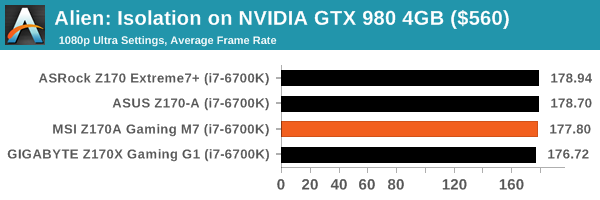
Total War: Attila
The Total War franchise moves on to Attila, another The Creative Assembly development, and is a stand-alone strategy title set in 395AD where the main story line lets the gamer take control of the leader of the Huns in order to conquer parts of the world. Graphically the game can render hundreds/thousands of units on screen at once, all with their individual actions and can put some of the big cards to task.
For low end graphics, we test at 720p with performance settings, recording the average frame rate. With mid and high range graphics, we test at 1080p with the quality setting. In both circumstances, unlimited video memory is enabled and the in-game scripted benchmark is used.
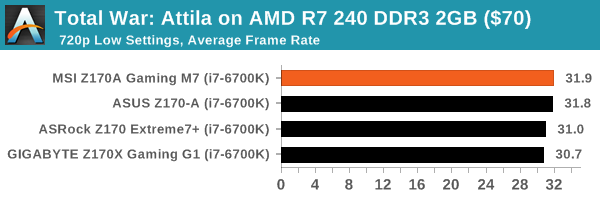
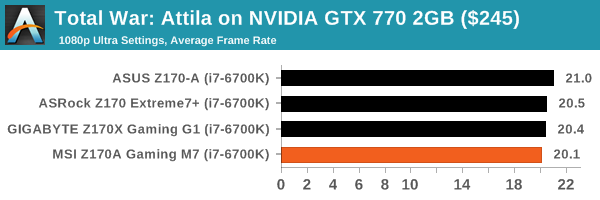
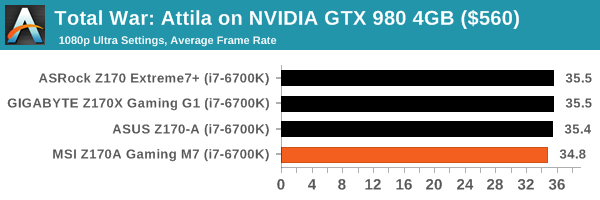
Grand Theft Auto V
The highly anticipated iteration of the Grand Theft Auto franchise finally hit the shelves on April 14th 2015, with both AMD and NVIDIA in tow to help optimize the title. GTA doesn’t provide graphical presets, but opens up the options to users and extends the boundaries by pushing even the hardest systems to the limit using Rockstar’s Advanced Game Engine. Whether the user is flying high in the mountains with long draw distances or dealing with assorted trash in the city, when cranked up to maximum it creates stunning visuals but hard work for both the CPU and the GPU.
For our test we have scripted a version of the in-game benchmark, relying only on the final part which combines a flight scene along with an in-city drive-by followed by a tanker explosion. For low end systems we test at 720p on the lowest settings, whereas mid and high end graphics play at 1080p with very high settings across the board.
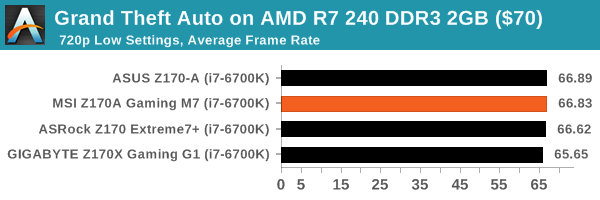
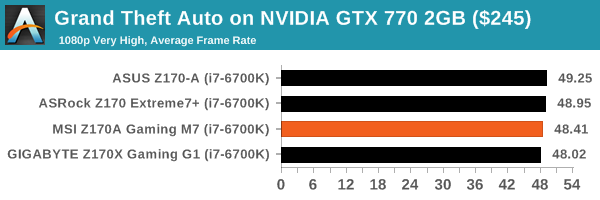
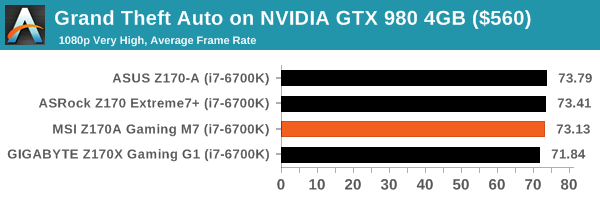
GRID: Autosport
No graphics tests are complete without some input from Codemasters and the EGO engine, which means for this round of testing we point towards GRID: Autosport, the next iteration in the GRID and racing genre. As with our previous racing testing, each update to the engine aims to add in effects, reflections, detail and realism, with Codemasters making ‘authenticity’ a main focal point for this version.
GRID’s benchmark mode is very flexible, and as a result we created a test race using a shortened version of the Red Bull Ring with twelve cars doing two laps. The car is focus starts last and is quite fast, but usually finishes second or third. For low end graphics we test at 1080p medium settings, whereas mid and high end graphics get the full 1080p maximum.
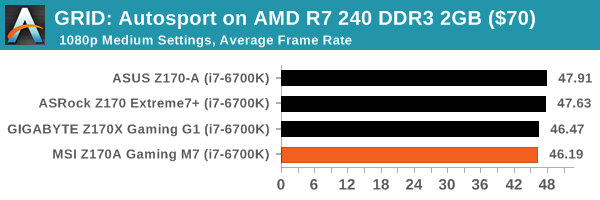
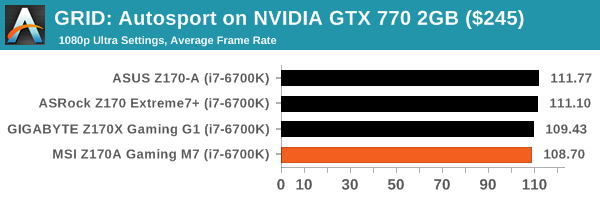
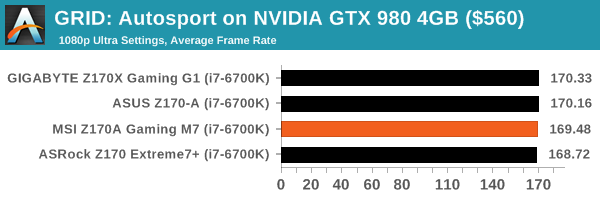
Middle-Earth: Shadow of Mordor
The final title in our testing is another battle of system performance with the open world action-adventure title, Shadow of Mordor. Produced by Monolith using the LithTech Jupiter EX engine and numerous detail add-ons, SoM goes for detail and complexity to a large extent, despite having to be cut down from the original plans. The main story itself was written by the same writer as Red Dead Redemption, and it received Zero Punctuation’s Game of The Year in 2014.
For testing purposes, SoM gives a dynamic screen resolution setting, allowing us to render at high resolutions that are then scaled down to the monitor. As a result, we get several tests using the in-game benchmark. For low end graphics we examine at 720p with low settings, whereas mid and high end graphics get 1080p Ultra. The top graphics test is also redone at 3840x2160, also with Ultra settings, and we also test two cards at 4K where possible.
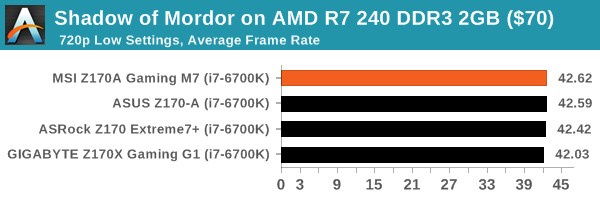
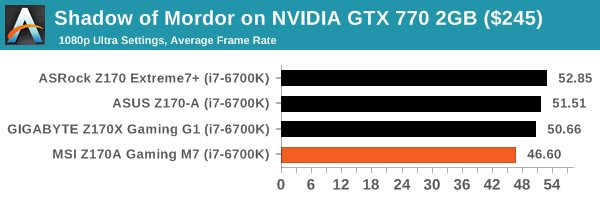
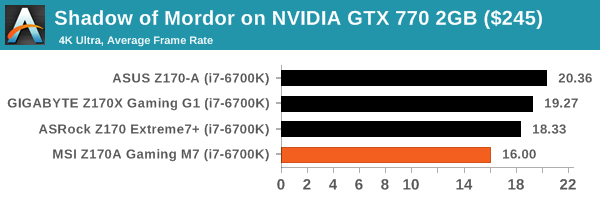
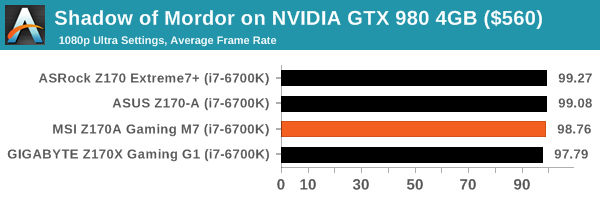
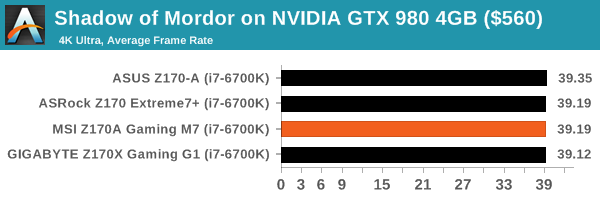
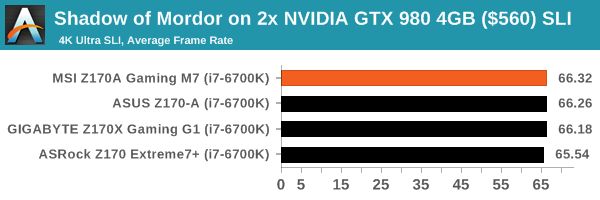


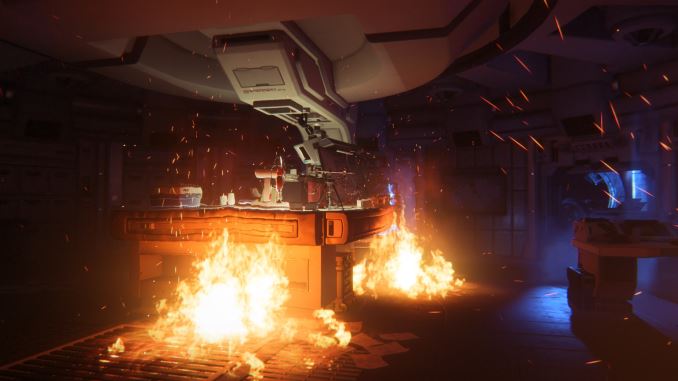
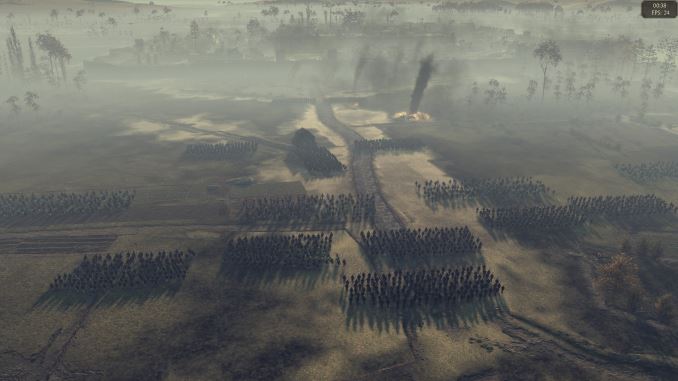
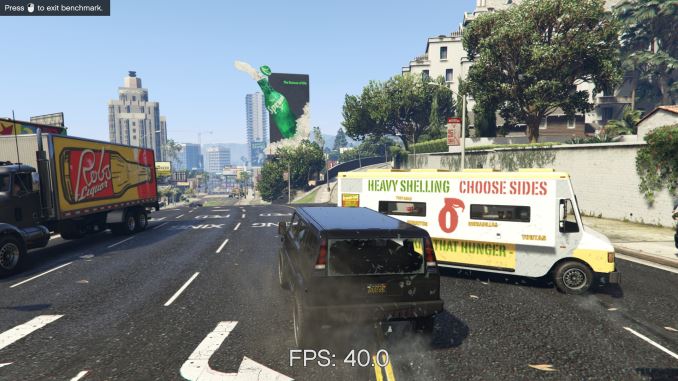
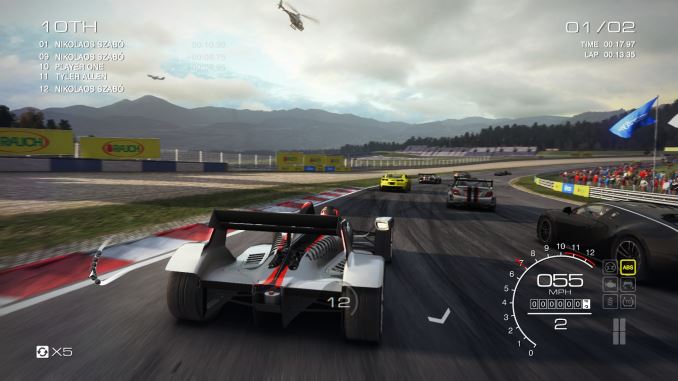
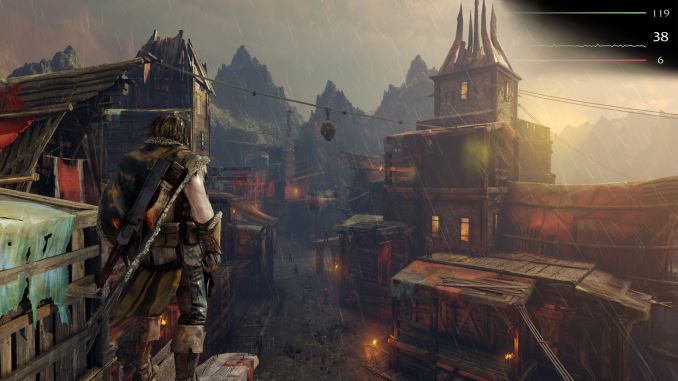








56 Comments
View All Comments
reininop - Monday, September 21, 2015 - link
What kind of hangs are you having? I'm having my own issues with an Asus Deluxe. I've had everything from USB driver issues, to what appear to be CPU failures, to corrupted MBR's that magically uncorrupt. I haven't noticed any issues with the sound on mine.PPalmgren - Tuesday, September 22, 2015 - link
I'll be playing a game, and with the GPU and processor well within reasonable loads and temps, I'll get a freeze with a ~half second sound loop, usually loud as hell. In about 5 seconds the comp will straight up crash. Because AI Suite doesn't install, and I'm unfamiliar with most monitoring software, I've had to resort to using the windows monitor for error messages to hopefully track down the issue. All of my errors point towards the sound drivers.DanNeely - Tuesday, September 22, 2015 - link
If your system is failing it a way that generates a memory dump before restarting, take a look at Who Crashed. It does basic analytics on the dump and can report the driver responsible, the error code, and possibly what the code means (not sure how extensive the latter is; in my case it only happened for errors that meant my OC was just barely too high for long term stability).http://www.resplendence.com/whocrashed
PPalmgren - Tuesday, September 22, 2015 - link
Thanks for the tip. Unfortunately, I didn't have a memory dump so the last one I saw with this tool is over 6 months old. I'll keep fighting the good fight.fluxtatic - Wednesday, September 23, 2015 - link
In your shoes, I'd uninstall the sound drivers and grab the reference drivers from the OEM site (RealTek, I would guess) - as an added bonus, you'll probably gain the ability to use loopback recording, which MS and OEMs tend to disable.fluxtatic - Wednesday, September 23, 2015 - link
And check for BIOS updates - I had some strange issues with my Asus M5A97 Evo a while back and the latest BIOS got everything back to right.PPalmgren - Wednesday, September 23, 2015 - link
Thanks for the help, I'll give that a shot with the sound drivers. I see Realtek fortunately keeps it nice and narrow down to two codec selections, one for AC97 and one for HD. I'm guessing the one on this board is Realtek HD Audio, but I wonder if there's some way to find out for sure which module is being used. It has a little cover on it with ASUS's branding so you can't read the chip directly. The only thing I was able to find with a reference was a single Tom's forum post.reininop - Wednesday, September 23, 2015 - link
I doubt it's your audio. The audio loop is common on black screen crashes, which sounds like what you are having. The blue screen windows crashes are the only ones that will generate a minidump for whocrashed to analyze.Are you overclocking at all? I've dropped mine down to stock frequencies (RAM still at XMP speeds) and my random crashes seem to have stopped. When I stress test either the OC CPU or OC GPU independent of one another, they both pass all tests. When they run together, they apparently fail. I'm beginning to think my 12V rail is not performing to spec.
PPalmgren - Friday, September 25, 2015 - link
I'm currently running at 100% stock, even using default memory timings, and just had a crash in those setting last night playing Dota 2 which is a fairly tame game. GPU fan speeds were around 70% with temps in the 70's when playing (980 ti).Last night, after the crash, I made the move over to the default realtek drivers instead of the ASUS stuff. I'll play for a couple days and see if I get a crash again. Oddly, the crashes tend to almost always happen around 11 PM.
reininop - Saturday, September 26, 2015 - link
Well, just to update you a bit about my own. Stock settings didn't stop my crashes either. Temps are good, RAM is good. PSU retested good.... Took two steps back in video drivers and currently running good but not all that hopeful.